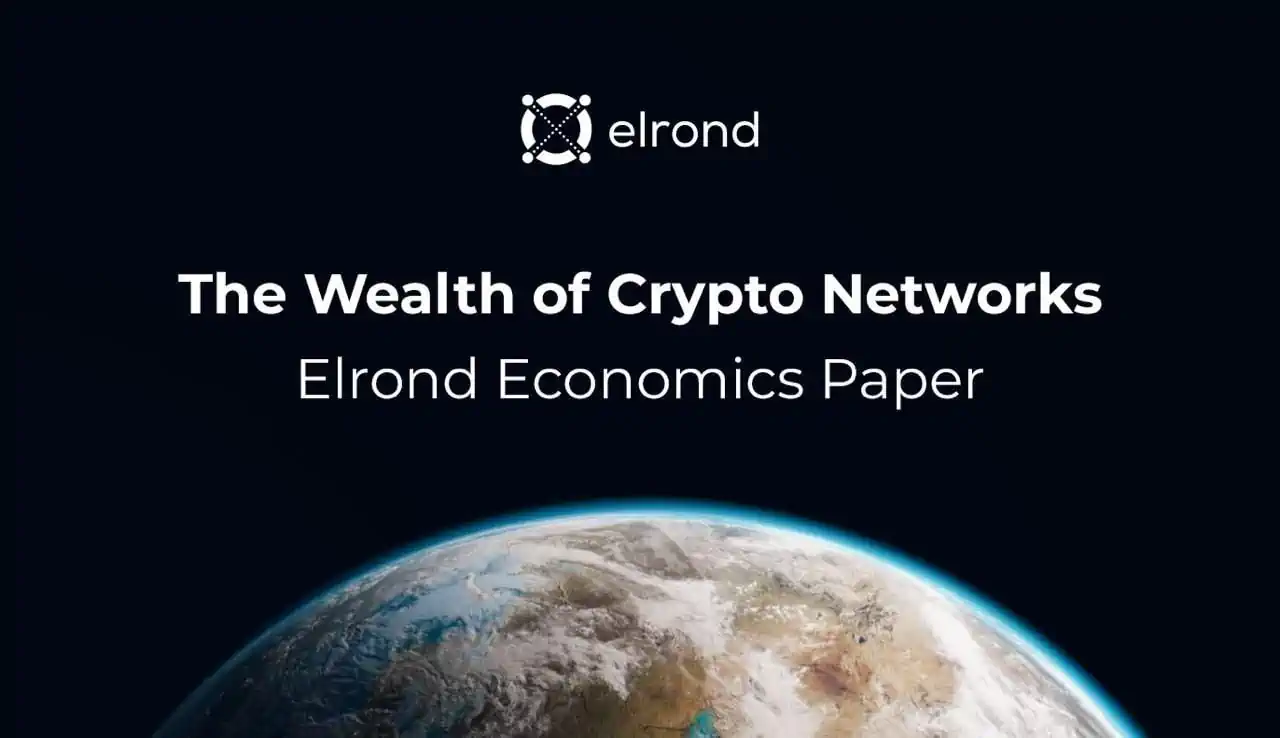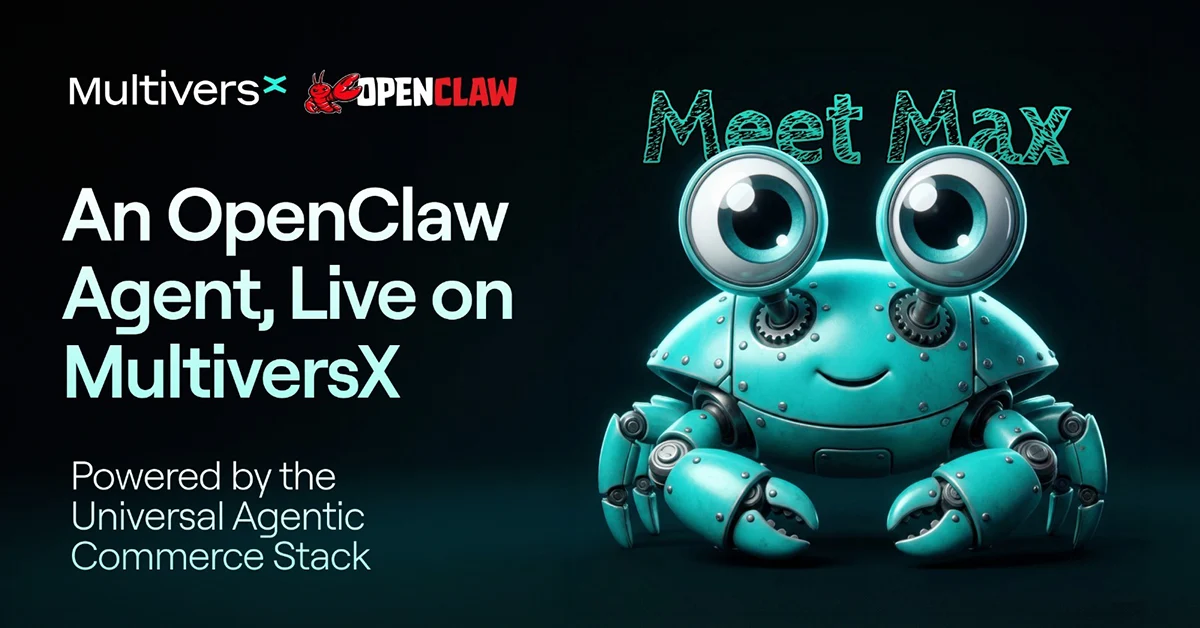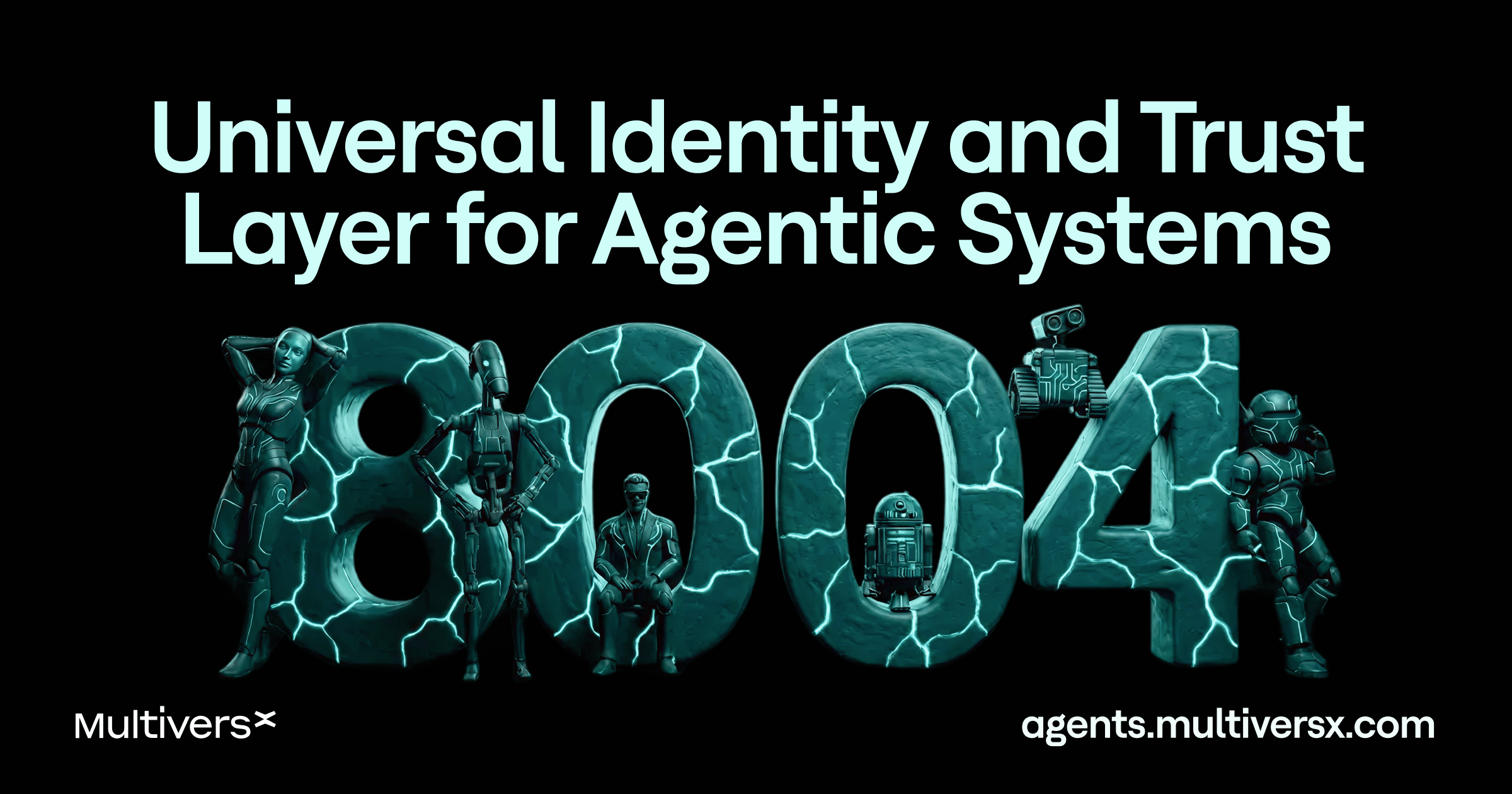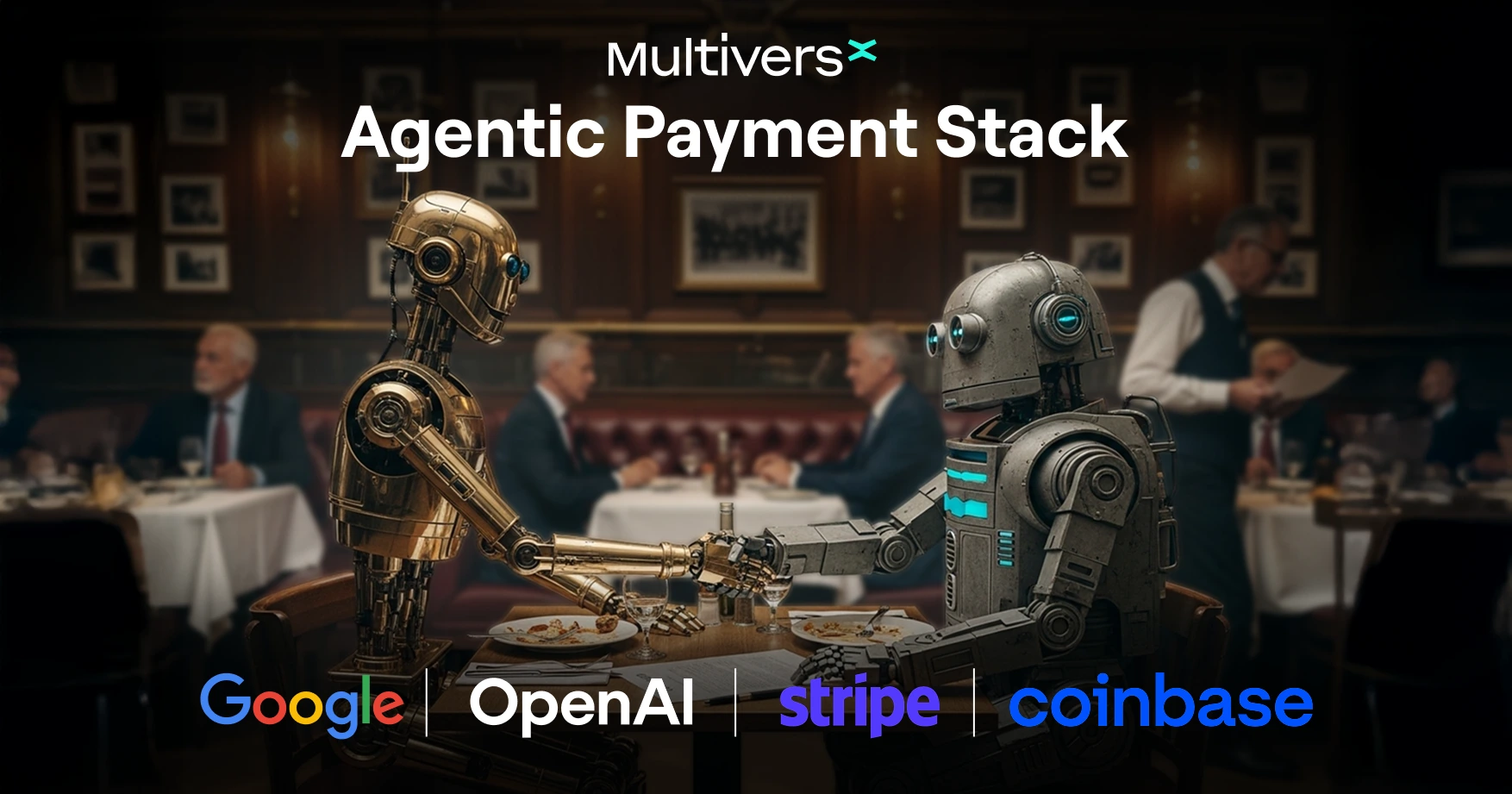

The Wealth of Crypto Networks - Elrond Economics Paper
The Economic paper we are publishing today presents the economic principles governing the Elrond Network, and how they keep everything aligned. You can read it here.
Reasoning and overview
Through Elrond we propose a bold vision for a post-capitalist world, providing a new economic model and language specifically designed for the information age.
The Elrond token, eGold (eGLD), will have an expected bootstrapping duration of roughly three-to-five years. The Elrond token is inseparable from the Elrond Network, and thus intrinsic to it. Some of eGold’s intended use cases include staking, delegation, payments, fees for storage rent and for smart contracts deployment, as well as rewarding the validators that contribute to the Network’s performance, stability and security.
During the first few years, our focus will be to establish Elrond as a global public utility within the internet ecosystem, offering a highly scalable, efficient, and interoperable blockchain architecture, with a growing economy built on its native eGold tokens. All activities within the network, such as processing transactions, running smart contracts, providing services like staking or running a validator node will be fueled by our native token. Both startups and large scale enterprises will be able to build decentralized applications on top of Elrond's Network or to integrate Elrond as part of their infrastructure solution for products and services.
In this first phase, gaining access to a recurring value stream generated by the network is conditioned by owning the eGold token, as the native asset of the Elrond Network.
Following this first period, we expect that eGold will naturally temporarily lend itself to becoming a currency or payment token as well, complementing conventional currencies thanks to its flexible programmatic mechanism. This means that eGold will likely become an efficient medium of exchange for various goods and services, since its owners will be able to send and receive eGold directly, globally, and inexpensively via transactions.
Once Elrond becomes a thriving global ecosystem and public utility, one might expect the token to become a robust store of value, owing to compounding programmable incentives and strong underlying network effects governing blockchain architectures. Its quality as a store of value will be a function of the underlying economic incentives amplified via real world adoption, defined conditional transition to a deflationary economic model, and accrued trust in the Elrond Network.
The Elrond Network, on the other hand, is a proof-of-stake based blockchain platform where a set of validators, who have staked eGold, produce blocks by reaching consensus. Validators are rewarded for their work and staked eGold. However, if a validator decides to intentionally depart from protocol instructions, they stand to lose part of their staked eGold due to slashing. The set of nodes elected as validators and their assignment to shards changes constantly (in each epoch, i.e. around once a day), and this number is limited depending on the current needs of the network in terms of security and throughput.
Any number of eGold holders can participate in staking indirectly by delegating their eGold to existing validators, usually professional validators (staking-as-a-service providers), that choose to accept delegations. An eGold holder indicates which validator candidates they trust, and puts some eGold at stake to support their delegation. If one or more of their candidates are elected as validators in an epoch, they will share with them any economic rewards or punishments, proportional to their delegated stake. Delegating eGold is a way of investing one's eGold, and contributing to the security of the system. The larger the total amount of eGold staked, the higher the system security, thanks to the increasing amount of stake needed by an adversary to get any nodes elected as validators.
Why Validators matter
In order to secure the network, Elrond will utilize a Proof of Stake model. Network participants bring value to the network. The more validators, the more eGold staked, and the greater the security and decentralization of the network. Given that sharded networks such as Elrond require a necessary number of validators to form several well secured shards, we have developed a validator client that runs on average consumer hardware and that is easy to deploy and maintain.
- Validators ratings
As with any decentralized and permissionless network, we are expecting to see participation from many validators, from different locations, using different hardware specs, infrastructure setups, internet connections, bandwidth, etc. This will lead to different performances in terms of up-time, response time, computation time, etc. While these variations are acceptable and expected, the more decentralized the network is, the clearer it becomes that specific actions are more desirable, while others actions are not.
Through the rating mechanism, we are rewarding desired performance (such as uptime and correct proposal of a block), but we’re also penalizing undesirable actions affecting the performance of the network (such as missing block proposals). The higher the rating of a node, the higher the chance to be selected as a consensus validator in a round (which implies having the opportunity to earn rewards). Conversely, the lower the rating , the lower the chance to be selected as a validator. The reward or penalty is performed merely through an increase or decrease of the node rating, so no slashing is involved.
- Slashing
Actions taken by validators, such as running other clients or modified code from the official client, can be detrimental to the operation of the network, and so require some punitive measures to be taken in the context of a PoS system. The security of a PoS system is held together through incentives in the form of reward and penalty. By requiring validators to put skin in the game via a locked eGold stake, they will have a strong disincentive to act maliciously due to their economic value being at risk.
Slashing is not yet active but we are considering and researching different approaches:
- We might consider gradually increasing the amount slashed, as the time pass and the network becomes more mature
- We might consider increasing the amount slashed based on the number of other validators slashed at the same time, so that we further discourage coordinated actions by multiple malicious actors
- Staking rewards
Staking rewards, possibility of slashing, or increasing/decreasing a node rating, are a set of incentives that encourage token holders and validators to secure the Elrond Network. In return for security, the validators can increase their relative share of token holdings in the network.
There will be a minimum guaranteed reward amount per year, that is decreasing every year so that in the 11th year it reaches 0, meaning the network by that time should become self-sustainable only through fees. The minimum guaranteed reward amount will come from fees, while the rest will come from inflation. So the maximum inflation rate per year, if fees are 0, is:

If the cumulative sum of fees during one year is higher than the minimum guaranteed rewards, inflation rate becomes zero and the rewards distributed will be higher than the minimum guaranteed rewards. Otherwise, total fees will just decrease the inflation by the corresponding amount. By adopting this approach, we have created the premises for the transition to a deflationary monetary system.
- Un-staking
If a validator wishes to un-stake, he initiates a transaction that indicates he wants to unstake a number of nodes, including the BLS public key of each node. The transaction is generated by the validator and sent to the metachain. At the end of the epoch, when nodes are re-shuffled, those who un-staked during the just-completed epoch will be shuffled out first.
- Unbonding
The unbond period is set at 10 days, after which the node will be able to retrieve its previously staked funds.
Delegation as a second staking option
Since not everyone will be able to be a validator and run a node, those who still want to stake, can delegate their stake to other validators or Staking as a Service providers, and split the rewards between them.
Usage and Fees
A sustainable value stream for the network can come from transaction fees and asset inflation. Since the success of the network is reflected by the adoption and usage which will generate transaction fees, the economic model will be able to finance the growth and maintenance of the network without the need of inflation.
The calculation and distribution of rewards and fees is done at the end-of-epoch, and added to the start-of-the-epoch block by the block proposers, verified by all the validators.
For all blocks produced in each round, by each shard, 10% of the block transaction fees go directly to the block proposer. The other 90% of all transaction fees of a block are added in a pool and are distributed to all validators at the end of the epoch. Just the block proposer takes 10% of the fees in the current block.
After reviewing initial simulations, we have decided that transaction fees will start with 0.00005 eGold per transaction.
Transaction fees are calculated using a gas model. This takes into consideration: the quantity of resources used per transaction, including:
- CPU
- Bandwidth
- Storage
This list provides 584 operations and their associated gas amount that will be used at Genesis.
Storage fees
Storage should be considered separately from computation or bandwidth, because each smart contract transaction that will require storage across all validators going forward, is not just subject to a one time fee at the execution of the transaction, but also a storage cost.
Elrond will introduce a state rent for smart contract transactions, where there will be a fixed price per each byte that needs to be stored (in the future this fixed price can be adjusted via governance), a price that will be paid periodically. The state rent price is applied only to smart contracts and not to normal balance accounts. We will also introduce a mechanism to temporarily clear the state of an account (unable to pay the rent), to hibernate the account, and restore it once needed.
Developers fees and monetization
In order to significantly accelerate developer adoption, we will provide developers with a built-in protocol monetization solution. Thus 30% of the fees directly associated with a dApp, will go to the developer. So when processing a smart contract transaction, 30% of the fees from that transaction will be added to the smart contract balance.
eGold, the native Elrond currency
The native Elrond eGold token is opening a new growth phase for the Elrond economy. It is a natural step toward enabling native Elrond services such as staking and delegation, and native DeFi options.
Here’s an overview of the most important eGold premises:
- The eGold currency is designed for simplicity and global adoption
- The eGold currency is designed as a digital reserve standard and robust store of value
- Built-in scarcity to reinforce value and demand
- Strong staking incentive for validator adoption paired with a max supply limit:
- Adoption reduces this theoretical inflation and increases scarcity
- A sustainable adoption model growing the entire eGold economy and reinforcing deflation
Protocol sustainability
The protocol sustainability address will receive 10% from the total generated rewards, in order to provide the necessary resources and funds to further develop, maintain and promote the Elrond protocol.
Future work
A promising direction for future work will investigate using an algorithmic stable token for fees.
Also, by enabling a new set of tickers with an e as a prefix, like eGLD, we make things simple and intuitive to understand, but perhaps even better, enable a flexible and coherent derivation path based on the E prefix, compatible with listing an unlimited set of new currencies on top of the Elrond Network.
Moreover, eGold, besides being locked in staking and delegation, could be used to stabilize the value of Elrond stabilized assets, becoming a reserve component. The reserve might consist of a basket of cryptocurrencies that helps the protocol to reduce the supply of future Elrond stable-assets.
In order to read more details and in-depth information about the Elrond economic model please read the Economics paper here:
https://elrond.com/assets/files/elrond-economics.pdf
Discussion
This paper is the first public draft of the Elrond economic model. The individuals and companies contributing to this paper operate in a dynamic environment where new ideas and risk factors emerge continually. Thus, we are constantly looking for feedback, with new assumptions that could challenge and improve parts of our model. We encourage those who want to contribute, to provide their feedback on the Elrond Forum.
Disclaimer
Nothing in this paper or elrond.com website is an offer to sell, or the solicitation of an offer to buy, any tokens. Elrond is publishing this paper solely to receive feedback and comments from the public. Nothing in this paper should be treated or read as a guarantee or promise of how Elrond’s business, services or the token will develop or of the utility or value of the token.
This paper and elrond.com website outlines current plans, which could change at its discretion, and the success of which will depend on many factors outside Elrond’s control, including market-based factors and factors within the data and cryptocurrency industries, among others. Any statements about future events are based solely on Elrond’s analysis of the issues described in this paper or elrond.com website. That analysis may prove to be incorrect.
Elrond eGold (eGLD) incorporates no connection to physical gold or gold derivative instruments. eGLD is not a "stablecoin" and may be volatile and/or may lose value. No recommendation is made herein as to the advisability of purchasing eGLD; notwithstanding, do not purchase eGLD if you cannot bear the loss of the entire purchase price.






